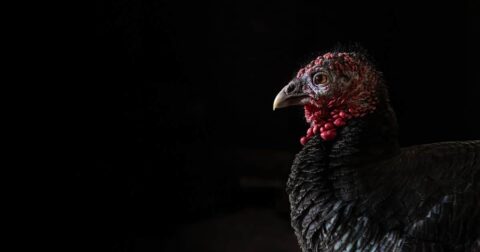Investigation
Oklahoma’s Loophole: How Tyson’s Water Use Goes Unchecked
Food•15 min read
Explainer
Turkeys can live over a decade in the wild. But on farms, they’re slaughtered as young as 12 weeks old.


Words by Gabriella Sotelo
Each year, around 218 million turkeys are produced in the U.S., with 46 million alone killed just for Thanksgiving. Turkeys are intelligent, social creatures capable of forming strong bonds. But in industrial farming, their lives are cut short, far from the natural lifespan they would experience in the wild.
During the spring nesting season, wild female turkeys (called hens) will lay between nine and 12 eggs, incubating them day and night, for about 28 days.
On factory farms, however, hens are made to lay 100 to 130 eggs per laying cycle, until their productivity declines. The eggs are immediately collected. Turkey eggs are then transported to commercial hatcheries, where they are placed into incubators.
Newly-hatched chicks — called poults — usually leave the nest within 12 to 24 hours. In two weeks, poults can fly short distances and start roosting in trees.
Juvenile males are called jakes, and juvenile females are called jennies. In the wild, jakes can breed at 1 year old. But they may find it difficult to compete with mature toms, and wind up traveling in search of a mate.
Their factory-farmed companions are managed at a younger age, between 14 and 18 weeks old, and go through semen collection. Female turkeys are moved into a laying house at around 30 weeks old.
The New Roots Institute writes that when hens can’t produce eggs anymore, they then go through forced molting. “Force-molting is induced by placing the hens in a completely dark house and removing all food and water for 72 hours. Feed and water are returned gradually. This deprivation of food, water, and light induces an additional egg-laying cycle in the hens.” After they no longer have the ability to lay eggs, they are usually killed.
Most turkey breeds will mature between 14-22 weeks of age. Heritage breeds, however, take 25-30 weeks. Turkey toms grow to an average live weight of 41 pounds, while hens average 17 pounds each. Factory-farmed birds grow astonishingly quickly. Depending on the breed, they can weigh between 11 to 35 pounds by the time they are slaughtered (between 12 weeks to five months old).
There are several key factors that typically impact a turkey’s lifespan, the most important of which is whether the turkey is wild or living in captivity, particularly a factory farm.
Wild turkeys thrive in and around mature forests that produce mast. Mast is the “fruit, nuts and seeds of woody plants,” according to the University of New Hampshire. In the spring, free-roaming turkeys tend to eat leaves and grass, while in the fall, these creatures feed on fruits, berries, seeds and insects.
Factory-farmed turkeys, on the other hand, are typically fed mostly corn and soy, so they can gain weight faster. These turkeys are also given antibiotics to prevent diseases that they may get from their crowded living spaces.
Farmed poults need a lot of heat to survive. As a result, turkey producers are instructed to heat their turkey houses, called brooders, to 90-95 degrees in the first week after the turkeys hatch, decreasing it by five degrees every week until the birds have all of their feathers and can better maintain their body heat.
For wild turkeys whose environmental conditions aren’t controlled by humans, the length of their lives is highly dependent on the environment in which they live. Local wild turkey population rates shift throughout the year depending on a number of environmental factors.
Turkeys are also highly susceptible to pathogens, and are vulnerable to diseases that do not affect chickens. As a result, it’s not recommended that producers keep the two types of birds together. Vaccinations are available, but generally not recommended, for small-scale producers, absent a specific threat.
The farmed turkey industry has long used selective breeding techniques to grow larger turkeys that produce more breast meat, leading to an increase in birds that are very susceptible to heart disease and other infections. Heritage birds are not susceptible to many of these conditions, due to their more balanced size and spacious living conditions.
How long turkeys live varies depending on whether the animal is wild or raised in captivity, particularly for slaughter.
In the wild, the life expectancy of a turkey when they are young is three to four years. But if they reach adulthood, they can live up to 10 years.
Domesticated turkeys, such as those on factory farms across the country, are killed between five and six months old. Pet turkeys can live up to 10 years.
A farmed turkey’s lifespan depends on the turkey’s gender. Hens are considered ready for slaughter at 14 to 16 weeks old, and male turkeys at around 19 weeks old. Some intensively farmed turkeys are slaughtered as young as 12 weeks old.
In 2022, researchers discovered a 12 year old hen in Pennsylvania. This turkey joined other record-breaking turkeys, including a banded gobbler in Texas that lived to be 13 years old, and a 12-year-old hen in California, according to the National Wildlife Turkey Federation.
Turkeys can live for many years, sometimes reaching 10 years or more, if they are not raised in factory farm conditions. In contrast, most turkeys in commercial farming are slaughtered at just five to seven months old, long before they have a chance to reach their natural lifespan.